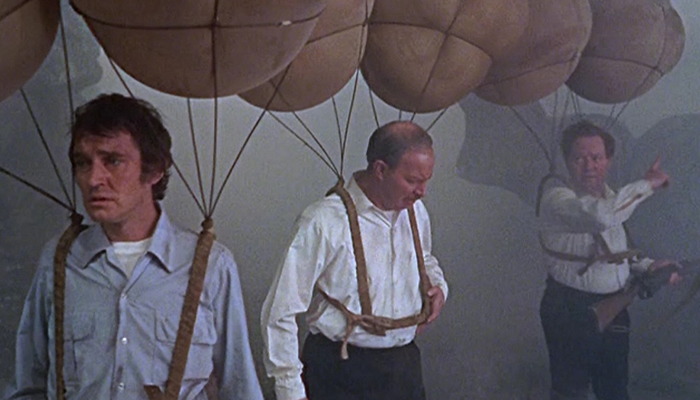
The Black Maria Review: Childhood Nightmares: The Lost Continent (1968)
Written by: Wade Sheeler, Special to CC2K
Cinephiles often reminisce about their earliest film experiences. Wade Sheeler, Creative Editor at Black Maria, shares one of earliest childhood film memories; one that equally haunts and fascinates him to this day: Hammer Studios’ The Lost Continent.
If you’ve been going to the movies since you were a child (I saw my first film at 4), you probably have some very early memories associated that are very formative and nebulous; an image or a color or a sound effect that stay in your subconscious, once in a rare while, tapping you on the shoulder, just within your peripheral vision.
For me, this film is Hammer Studios’ The Lost Continent. The fact that I know the title is a small victory, since for years I only had the nightmares and the fleeting images to call upon when trying to figure out what the hell this movie was. But whenever I want to conjure up the most visceral and frightening childhood nightmares, this is the film that still haunts me.
I saw it again about ten years ago, and then recently; and while it’s easier to view the film with a mature eye, just like a Stephen King story, the soundtrack and images can still reduce me to a frightened child.
Best described as “The Love Boat on Acid,” this sixties creeper offers up no doubt that the Art Director Arthur Lawson, and Director Michael Carreras “dropped” something when creating the world this movie inhabits.
The story involves a steamer ship carrying illegal explosives and passengers with sordid pasts, all looking to escape Freetown, Sierra Leone in West Africa and make it to Caracas, Venezuela. During the journey, the Captain deals with mutiny and insurrection. He and the passengers are put off the ship, but find their way back.
As the ship continues and falls off course, it journeys deeper into the uncharted Sargasso Sea. And this is when things get undecidedly weirder.

The ship becomes surrounded and immersed in a red, “chattering” sea weed. The captain dips his hand in, as the plant wraps itself around his arm, sucking his blood. He manages to untangle himself, but the ship’s cook tumbles overboard and is soon swallowed up by the carnivorous vegetation.
Red mist and seaweed blanket the ship until it stops moving. It’s hard to decipher whether it’s day or night. A girl appears, buoyed by balloons, walking on the seaweed with the assistance of large, flat snow-like shoes and stilts to allow her to travel unfettered. She warns the ship’s crew that they will soon be attacked, and explains she and her people are living on a nearby island, but at war with the “descendants” of Spanish conquistadors and pirates for whom time has stopped.
The crew follows her to her island, where they are attacked by a giant hermit crab, which is then attacked by a giant scorpion. Then they are captured by the Spanish Conquistadors, and things get even stranger. A boy “prince” leads the motley bunch, which include men dressed in red and white silken robes and hoods reminiscent of Klan members. Then there’s a monster the cult sacrifices victims to that resembles a vagina dentate. It all comes to a fiery, violent end, with an organ pounding and screaming sacrificial virgins.
And then I wake up in a sweat, screaming for it all to stop.

It’s even stranger than it sounds. Just remembering it is causing heart palpitations and the shakes. The sounds of the seaweed chattering, the characters who fight through all these fantastic impediments without the slightest surprise at what keeps getting thrown at them, the psychedelic soundtrack and the reddish hues; all deliver on the promise of a feverish nightmare.
Hammer Films deserve a special place in the pantheon of 60s British Cinema, but The Lost Continentdeserves its own holy shrine. Director Michael Carreras was one of the company’s “go to” directors, who also produced over 65 films from the early 50s to the late 70s, and while several of them carry that strange “netherworld” element, none so creatively tap into the dreamlike subconscious as The Lost Continent.
The most recent DVD, released 14 years ago, has a muddy soundtrack and mediocre picture quality. There are some good extras, including Hammer previews and deleted scenes, but a real restoration would be welcome.
Even so, watching it again, the current state of the print just adds to its dreamlike quality. If you can handle the eerie tone of your own personal nightmares transferred to the screen, check out The Lost Continent. It may not haunt you like it did me, but I defy you to turn off the lights afterwards.
